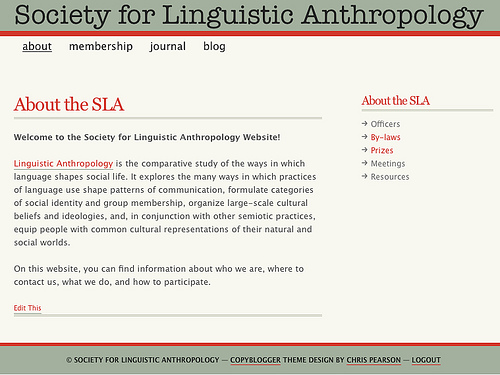Just a random couple of notes on two tools that I’ve looked at recently.
1) Mary Murrell points out that the Institute for the Future of the Book has released Sophie 1.0 and has announced a competition for a workshop at the institute for multimedia literacy at USC. Sophie is a multi-media authoring tool– a bit like Macromedia Director, for those who can remember that far back into the last millenium, but much much better. It’s open source, it has a very nice interface that allows for rapid construction of multi-page documents which can incorporate sound, video and images. It has a timeline for creating time-based presentations and it handles most of the main formats without trouble. It does take a bit of energy to learn, but it could be used to create really rich presentations or documents. It’s kind of the perfect in-between-film-and-text tool. The only shortcoming is that it produces its own file format which requires the sophie reader (also free, and available on mac-windows-linux) to read a book produced in sophie. This means that docs can’t be easily displayed on the web, but requires the viewer to download and install a piece of software. Better for presentations than stand-alone docs, I guess. However, it looks like one could export the time -based stuff to a movie format, and the text-based stuff to a pdf, so it’s not that bad.
2) On the extremely cool, but maddening side is Apture. Apture is an amazingly clever add-on to a web-site that allows beautifully clever links that pop-up and move the window around and allow you to quickly add photos and video to any site. It’s hard to explain (go play with the the demo). The down side is that this is 1) so NOT free and open source software, and as far as I can tell a direct route into allowing apture to basically display whatever it wants on your site, in order to get this functionality (it uses a remote application server that essentially serves content on top of your site, so it’s a bit like an annotation service); and 2) it ruins the “view source” aspect of the web by overlaying content that cannot be easily investigated, as one can with normal content displayed in a browser. Apture is hardly the main culprit here, but they are part of a trend towards the obfuscation of web technologies, towards a re-closing of the source so that it becomes harder and harder for individuals to teach themselves such new tools. Indeed, Apture is not intended to be learned and re-used by anyone except at the interface level, unlike the wealth of tools (HTML, PHP, perl, python, ruby) that we have come to expect as part of our information environment. This makes me sad and mad. I wish they could see the light 🙂

